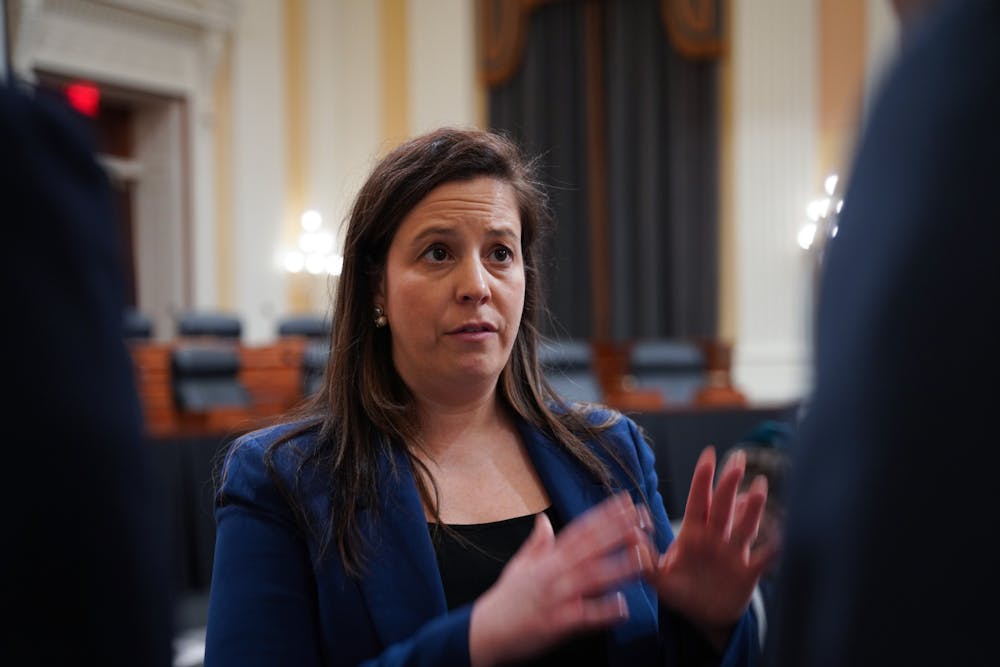
United States Rep. Elise Stefanik (R-N.Y.), whose questioning of former Penn President Liz Magill during a congressional hearing on campus antisemitism led to Magill’s resignation, was tapped to serve as the U.S. ambassador to the United Nations.
In a statement on Nov. 11, former President, President-elect and 1968 Wharton graduate Donald Trump announced Stefanik’s nomination as U.S. ambassador to the UN. The announcement of Stefanik — who is currently the fourth-ranking Republican in the U.S. House of Representatives and has been a strong political ally of the president-elect — comes amid a wave of Trump’s Cabinet appointments following his victory in the 2024 presidential election.
Stefanik, who was first elected to the House in 2014, represents a rural portion of upstate New York. She gained national attention in the fall of 2023 as a leading figure in the House Committee on Education and the Workforce’s investigation into how universities, including Penn, were responding to campus antisemitism.
In a December hearing of the Committee on Education and the Workforce, Stefanik repeatedly asked Magill — as well as former Harvard University President Claudine Gay and Massachusetts Institute of Technology President Sally Kornbluth — if a call for the genocide of Jewish people would violate Penn’s policies or code of conduct, citing calls for “Intifada revolution” as an example.
Magill responded that “if the speech turns into conduct, it can be harassment.”
Following Stefanik’s repeated questioning, Magill stated that a call for the genocide of Jews would constitute as harassment “if it is directed, and severe or pervasive,” later adding that it would be “a context-dependent decision.”
Magill received harsh criticism for her testimony from Penn community members and elected officials. Pennsylvania Gov. Josh Shapiro, an ex officio member of the University Board of Trustees, told reporters that Magill’s comments at the hearing were “absolutely shameful.”
Days after the hearing, Magill resigned alongside Board of Trustees Chair Scott Bok.
“One down. Two to go,” Stefanik wrote following the dual resignations. “This is only the beginning of addressing the pervasive rot of antisemitism that has destroyed the most ‘prestigious’ higher education institutions in America.”
On Oct. 31, Congress released the findings from its yearlong investigation in a report that revealed the extent of Penn’s response over the past year to allegations of antisemitism on campus. Stefanik wrote that the reports showed “the moral bankruptcy of university leaders to take decisive action” and “[confirmed] personal attacks against [her] for pursuing their accountability.”
“Elise is a strong and very smart America First fighter,” Trump wrote in the announcement of Stefanik's nomination. “She will be an incredible Ambassador to the United Nations, delivering Peace through Strength and America First National Security policies!”
The president-elect also acknowledged Stefanik as a “staunch advocate” and the “first Member of Congress to endorse” his third bid for the Oval Office.
“The work ahead is immense as we see antisemitism skyrocketing coupled with four years of catastrophically weak U.S. leadership that significantly weakened our national security and diminished our standing in the eyes of both allies and adversaries,” Stefanik wrote on X, the platform formerly known as Twitter, while accepting the nomination.
The Daily Pennsylvanian is an independent, student-run newspaper. Please consider making a donation to support the coverage that shapes the University. Your generosity ensures a future of strong journalism at Penn.
Donate








